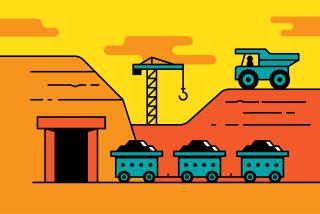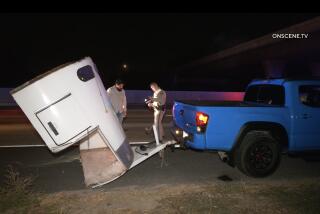The Battle for Happy Trails : In Norco, Horses Outnumber Humans, and Owners Stand Up to Be Counted
NORCO — In this rural enclave on the edge of Riverside County, it’s not so much whether you are pro-growth or anti-growth, liberal or conservative. Instead, what many say it comes down to is being pro-horse or anti-horse.
But that’s no surprise in Norco, a city of 25,000 where horses outnumber humans two to one. It is also where one of the most vocal lobbies is the Norco Horsemen’s Assn., a group of 350 owners of horses and farm animals.
For them, living in Norco isn’t just equestrian shows, parades and getting saddle sores. Rather, it is a battle to make sure that Norco remains a land of happy trails. Their mission: Make sure that Norco stays rural and keep developers from going overboard in rustling up the land.
“From past history, in other towns, the horse people have been moved out by developers,” said Terry Wright, Norco Horsemen’s Assn. founder. “ . . . If you don’t fight to keep your rights, you’re going to lose them.”
Central to their drive is the upkeep of Norco’s horse trails, 80 miles of sandy paths that line almost all city streets. Earlier this month, the Horsemen’s Assn. argued for--and got--guarantees from the city to target more money to improve horse trails. And the group has listed the city’s “Ten Worst Trails,” where paths have been eroded or are dotted with litter.
The Horsemen’s Assn. also keeps a watchful eye on city activity, urging new businesses to adopt Old West-style facades (even a proposed new Department of Motor Vehicles facility will look western), speeding up the process to get horse crossings installed at major intersections and arguing for signs to let out-of-towners know that in Norco, there are lots of horses and lots of horse people.
When rumors spread recently that a builder was thinking about developing Ingalls Park, Norco’s equestrian center, it brought an irate protest from horsy folk all over town, including groups such as the Saddlesore Riders and the Norco Mounted Posse. For its part, the Horsemen’s Assn. collected 3,000 signatures against the development, even though no project had been formally proposed to the city.
“What we did was not take a chance,” said Vic Jensen, Horsemen’s Assn. president. “We’re not giving up one damn more inch of Norco.”
Indeed, these horse people jealously guard their rights to ride the range.
Jensen told a story about how he attended a Norco Planning Commission meeting and discovered a housing development that included plans for “future” horse trails, rather than the preferred procedure of dedicating new trails as each house was built.
“I said: ‘Future? No way!’ ” Jensen said during a recent meeting of the Horsemen’s Assn. Board of Directors. “If they ain’t dedicated, they ain’t getting it.”
“Sometimes things will slip through,” Jensen said later. “We won’t let anything slip by us.”
But vocal horse groups have been a fixture through the years in Norco, which bears a horse as its emblem. Many restaurants and retail stores have hitching posts.
“The way to fill the council chambers is to talk about doing away with trails or licensing horses,” said Councilman Steve Nathan. “You’ll get a big turnout.”
According to some residents who were around in the early 1970s, when one councilman got on the bad side of some horse owners, about a dozen of them rounded him up from the council chambers, put a noose around his neck and threatened to hang him on a tree across the street. As the story goes, they set him free after he got good and scared.
Today, horse owners aren’t quite as posse-driven. But getting the horse vote remains an important priority for local politicos. In City Council elections earlier this month, candidates quickly lined up to proclaim themselves as animal-keepers. Some say that sort of Norconian patriotism remains an out-and-out necessity to get elected.
But candidates had to be careful. According to Wright, one prospective council member recommended at a Horsemen’s Assn. candidate’s forum at the local Sizzler restaurant that horse owners carry manure-scoopers to clean up after the horses. She was greeted by thunderous boos.
Even the rumor of being labeled as anti-horse can be a red herring. Bill Vaughan, who was narrowly elected to the council, said he would probably have gotten more votes had not someone spread a false rumor that he wants to do away with animal-keeping rights.
“That garbage they put on me, it appears to have turned (voters) off,” he said. “It hurt me. I should have done better.”
” . . . You just don’t win a council seat by being against animal-keeping rights,” he said.
And one suggestion was made during the campaign that horses be licensed.
“You have got to be kidding!” board member John Casper yelped when the idea was suggested at a recent Horsemen’s Assn. meeting.
Many of the fears held by horse owners come from past experience. Horsemen’s Assn. members speak of being “run out of town” in Orange and Los Angeles counties because changes in zoning codes prevented them from keeping horses.
“Unfortunately, greed is the biggest threat to our lifestyle,” said Judy Malich, a member of the association. “They do it slowly. They’ll do it in bits and pieces.”
Keeping a close eye is necessary, members say, even if it appears the city and the Horsemen’s Assn. are in sync in their protection of the rural lifestyle. But not everyone who moves into Norco has horses or animals. And some, albeit a small minority, are naysayers when it comes to horses.
“They don’t want the smell, the droppings, the animals,” said Barbara Carmichael, the president of the local 4-H club and a board member of the Horsemen’s Assn.
Carmichael boasts of owning a wide array of animals, including llamas, sheep and donkeys. She once seriously considered taking in a baby elephant.
Bobbie and Berwyn Hanna, other Horsemen’s Assn. members who moved from Anaheim a few years ago, figure that unless they keep a close eye on city activity they stand to be zoned out of their ranch, which is inhabited by two horses, two donkeys and a mule. They also built a western-facade shed, making their back yard look like a mini-Calico Ghost Town. Their fences bear an assortment of offbeat signs, including one that reads: ‘Please don’t feed fingers to the mules.’
“I’m a horseshoer and I don’t want to move out even further,” said Berwyn Hanna, who grew up in the Texas panhandle.
“If we don’t stand for this,” said Bobbie Hanna, “we’re going to become Orange County.”
More to Read
Sign up for The Wild
We’ll help you find the best places to hike, bike and run, as well as the perfect silent spots for meditation and yoga.
You may occasionally receive promotional content from the Los Angeles Times.






